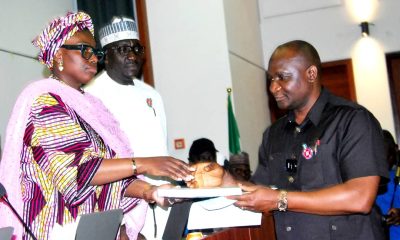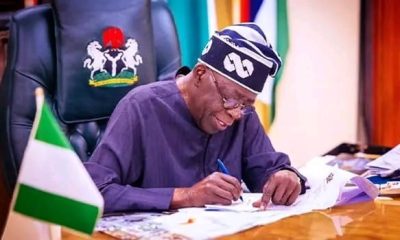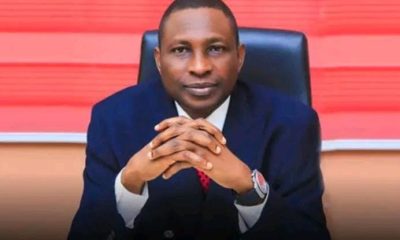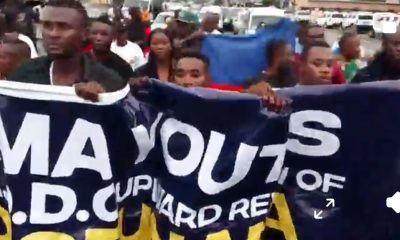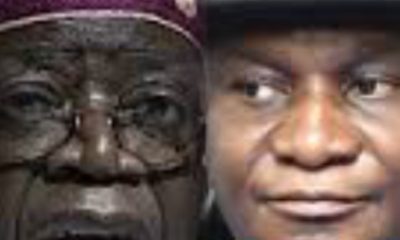National
OPINION: The Extravagance Of Power: A Critique Of Dr. Samuel Ogbuku’s Lavish Birthday Amid Niger Delta’s Enduring Misery, By Dr. Leonard Adawari Markson

September 14, 2025
OPINION
What should have been a modest milestone in a life ostensibly dedicated to public service has instead morphed into a multi-phase extravaganza, spanning cities within Nigeria and reportedly extending beyond its borders, all funded at least in substantial part—by the very taxpayers whose plight the NDDC was established to alleviate.
In the annals of Nigerian public administration, few spectacles encapsulate the grotesque disparity between elite indulgence and grassroots deprivation as vividly as the recent 50th birthday celebrations of Dr. Samuel Ogbuku, the Managing Director of the Niger Delta Development Commission (NDDC).
What should have been a modest milestone in a life ostensibly dedicated to public service has instead morphed into a multi-phase extravaganza, spanning cities within Nigeria and reportedly extending beyond its borders, all funded at least in substantial part—by the very taxpayers whose plight the NDDC was established to alleviate.
Reports indicate that over 5 billion naira of public funds were squandered on this opulent affair, a figure that, if verified, represents not merely fiscal irresponsibility but a profound moral bankruptcy. This essay endeavors to dissect the layers of this scandal, arguing that Dr. Ogbuku’s actions reflect a deeper malaise in Nigerian governance: a predilection for frivolity that perpetuates the cycle of poverty in regions like the Niger Delta, where oil wealth has long been siphoned off to fuel personal aggrandizement rather than communal upliftment.
To contextualize this, one must first recall the mandate of the NDDC. Established in 2000 under the Niger Delta Development Commission (Establishment etc.) Act, the agency was conceived as a bulwark against the environmental degradation, economic marginalization, and social unrest plaguing the oil-rich Niger Delta. Its core responsibilities include fostering sustainable development, infrastructure projects, and poverty alleviation programs for the nine states in the region—Abia, Akwa Ibom, Bayelsa, Cross River, Delta, Edo, Imo, Ondo, and Rivers.
Dr. Ogbuku, appointed to this pivotal role by divine providence or political patronage (depending on one’s perspective), was entrusted with stewarding resources to address the vulnerabilities of millions who endure polluted waterways, crumbling infrastructure, and endemic unemployment. Yet, in a cruel irony, his golden jubilee became a theater of excess, where the vulnerable were not invited to share in the joy but were instead indirectly footing the bill through diverted public coffers.
The celebrations unfolded in a series of ostentatious phases, each more lavish than the last, highlighting a deliberate detachment from the realities of those he serves. Phase one, held in Port Harcourt, the heart of the Niger Delta saw Dr. Ogbuku’s second wife orchestrate an event replete with celebrity appearances, chartered flights to ferry in entertainers, and hefty honoraria.
It is alleged that each celebrity received $20,000 merely for showing up, a sum that could fund scholarships for dozens of Niger Delta youths or repair dilapidated schools in oil-impacted communities. This Rivers State extravaganza set the tone for what followed: a blatant display of wealth that mocks the daily struggles of fishermen whose livelihoods are poisoned by oil spills or farmers whose lands are rendered infertile by environmental neglect.
Not content with one venue, the festivities migrated to Yenagoa in Bayelsa State, where another round of revelry unfolded, further straining resources that could have been allocated to flood control measures or healthcare initiatives in a region prone to ecological disasters. But the pinnacle of profligacy was reached in Abuja at the Transcorp Hilton, where rooms were fully booked for guests, including an array of on-call companions—euphemistically termed “baddies”for what was dubbed phase two.
This hotel takeover, with its implications of hedonistic excess, transforms a birthday into a symposium of indulgence, where public funds lubricate private pleasures. And lest we forget, whispers of international extensions to the celebrations suggest a global footprint, perhaps in exotic locales, amplifying the insult to a populace confined by poverty to their degraded environs.
Yet, the most egregious episode occurred on a private island in Lagos, where Dr. Ogbuku and his coterie of friends and colleagues reportedly engaged in an all-night bacchanal featuring invited strippers. This event, shrouded in secrecy but leaking through the sieve of social media and insider accounts, reeks of unbridled irresponsibility.
In an era where public officials are expected to embody ethical leadership, such shenanigans not only erode public trust but also perpetuate a culture of impunity. One cannot help but draw parallels to the Roman emperors of antiquity, whose orgiastic feasts precipitated societal decline. Here, in modern Nigeria, a man tasked with development descends into debauchery, funded by the sweat of the oppressed.
This is not mere personal failing; it is a systemic symptom, mirroring the Nigerian state’s propensity to prioritize ephemeral thrills over enduring progress.
At the heart of this lies a philosophical question: What does it mean for a leader, elevated by circumstance to a position of stewardship, to celebrate in isolation from those he is mandated to serve? Dr. Ogbuku’s ascent to the NDDC helm was not the result of aristocratic birthright but of a confluence of opportunities, political, social, and perhaps providential that placed him as a custodian of the Niger Delta’s aspirations.
Divine providence, if we invoke it, demands humility and service, not hubris and excess. Imagine, instead, a birthday marked by solidarity: distributing aid to flood victims in Bayelsa, inaugurating a vocational training center in Delta State, or hosting a communal feast for the elderly in Rivers. Such acts would have aligned with the ethos of ubuntu, the African philosophy of interconnectedness, affirming that one’s joy is incomplete without uplifting the collective.
Instead, we witness a solipsistic spectacle, where the celebrant revels amid opulence while his constituents languish in deprivation. This dissonance is emblematic of Nigeria’s broader narrative: a nation adrift in frivolities, where leaders chase ephemeral vanities while foundational issues, poverty, inequality, corruption, fester unchecked.
The branded luxurious gift items distributed to friends, relatives, and colleagues further illuminate this disconnect. Versace robes, towels, and slippers; Versace notebooks; electric wine openers; air fryers; customized iPhones, these are not mere tokens but symbols of elitist detachment.
In a region where many households lack basic electricity to power an air fryer or clean water to warrant a luxurious towel, such gifts border on the obscene. They represent a commodification of relationships, where public resources are repurposed as baubles for the privileged. One might argue that personal funds could justify such largesse, but the scale, over 5 billion naira in total expenditure—points inexorably to the misuse of NDDC allocations.
These items, emblazoned with the celebrant’s insignia, serve as trophies of excess, perpetuating a cycle where wealth is hoarded among the few rather than redistributed to the many. In economic terms, this is a classic case of opportunity cost: every naira spent on a Versace notebook is a naira denied to a microfinance program for Niger Delta women entrepreneurs or a borehole project in underserved communities.
This episode compels us to interrogate the structural underpinnings of Nigerian governance. The NDDC, like many parastatals, operates in a twilight zone of accountability, where oversight is nominal and audits are often retrospective fig leaves. Dr. Ogbuku’s celebrations expose the fault lines: a lack of fiscal transparency, weak institutional checks, and a political culture that rewards loyalty over competence.
It mirrors the Nigerian state writ large! A colossus lost in frivolities, where grandstanding eclipses governance. From lavish state banquets to inflated contracts, the pattern is recurrent: resources extracted from the peripheries fuel central excesses, leaving the extractive zones in perpetual penury. The Niger Delta, despite generating vast oil revenues, remains a paradox of wealth amid want, a testament to what scholars term the “resource curse.” Dr. Ogbuku, as a native son of this region, had a unique opportunity to disrupt this narrative; instead, he has reinforced it.
In light of these revelations, I call upon President Bola Ahmed Tinubu to intervene decisively. As the custodian of Nigeria’s executive authority, the President must initiate a thorough investigation into Dr. Ogbuku’s conduct, scrutinizing the NDDC’s financial records for any evidence of fund diversion. This is not merely about one man’s birthday but about restoring faith in public institutions. President Tinubu, who campaigned on a platform of renewed hope and anti-corruption, should call Dr. Ogbuku to order, perhaps through a public reprimand or, if warranted, his removal from office.
Such action would signal a departure from the complacency that has long plagued Nigerian politics.
Furthermore, Dr. Ogbuku owes the people of the Niger Delta a profound apology. He must acknowledge the diversion of funds intended for their welfare into these frivolous birthday adventures and commit to restitution, perhaps by redirecting equivalent resources to verifiable development projects. An apology without action is hollow, but it could mark the beginning of atonement. The Niger Delta’s inhabitants, who have endured decades of exploitation, deserve no less than transparency, accountability, and empathy from their leaders.
In conclusion, Dr. Samuel Ogbuku’s 50th birthday saga is a microcosm of Nigeria’s existential crisis: a nation where opulence coexists with oblivion to suffering. It challenges us to demand better, to envision a leadership that celebrates with the people, not at their expense.
Until such a paradigm shift occurs, the Niger Delta will remain a symbol of unfulfilled promise, its people languishing while their guardians feast. Let this serve as a clarion call for reform, lest we perpetuate a legacy of frivolity over fraternity.
By Dr. Leonard Adawari Markson is a socio-political analyst and advocate for sustainable development in the Niger Delta, based in Port Harcourt.
,

